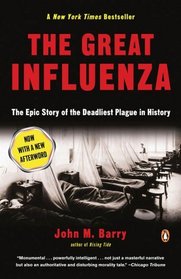Mary B. (MaryJeanne) reviewed The Great Influenza: The Epic Story of the Deadliest Plague in History (Revised Edition) on + 10 more book reviews
Helpful Score: 4
Great book for anyone who loves medical history.
Holly L. (irunamuk) reviewed The Great Influenza: The Epic Story of the Deadliest Plague in History (Revised Edition) on
Helpful Score: 3
Excellent book. Well written, very informative. If you like this you may also like "The Demon Under the Microscope" by Thomas Hager and "Ghost Map" by Steven Johnson.
Dave L. reviewed The Great Influenza: The Epic Story of the Deadliest Plague in History (Revised Edition) on + 43 more book reviews
Helpful Score: 3
The first part of the book is.both interesting and a page turner but the last 150 pages are a little slow and disconnected. Regardless, a really great book worth reading.
Karen H. (SashaFletch) reviewed The Great Influenza: The Epic Story of the Deadliest Plague in History (Revised Edition) on + 121 more book reviews
Helpful Score: 2
This is a VERY thorough book about the Influenza Pandemic that killed millions of people world wide between 1917 and around 1920. The author gives a nice overview of the progression of medical science from around the 1500's up until the pandemic hits. I found that very interesting. However, once the author began writing about the actual pandemic, I found that he used many more words to say what could have been said in fewer. I think this 465 page book could have been just as effective, and a little less boring if he had cut off about 65 of those pages. He repeats himself a lot and really goes on and on about some subjects in order to impress upon the reader how bad the conditions really were. I can respect that, however, by the time I was 2/3 of the way through the book, I was ancy for it to end. That's too bad because it is apparent the author did a lot of excellent research and really knew his subject in order to prepare and write this book. But overall, it is a very informative and interesting case history about what happened when the pandemic hit right in the middle of WW I.
Linda H. reviewed The Great Influenza: The Epic Story of the Deadliest Plague in History (Revised Edition) on
Helpful Score: 1
I was drawn to this book because one of my great uncles died of influenza while in the Army for World War I, and another great uncle wrote home about being quarantined while at boot camp. This book was a fascinating explanation of the disease, how it mutates and spreads, why there is no vaccine, and how it effects the body.




